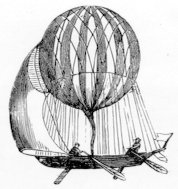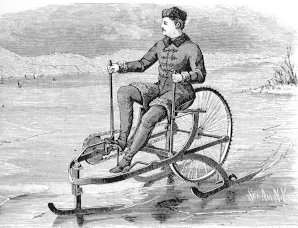Learning Curve
Today, a thought about technological change and learning. The University of Houston's College of Engineering presents this series about the machines that make our civilization run, and the people whose ingenuity created them.
Let me try an idea on you. It's about learning, but I'll begin with a recollection: I saw my first movies, the early talkies, at the Uptown Theater in St. Paul, Minnesota. The ceiling of the Uptown was deep blue with little light bulbs scattered across it. It felt like an open courtyard under a starry, moonless sky.
The images on the screen were grainy black and white, sometimes toned sepia or green to give an illusion of color. The actors stood still to recite their lines where the microphones could pick them up. They spoke in an accent peculiar to the formal stage.
Today, when the Metro Goldwyn Mayer lion leans out and roars at the beginning of a movie, I still feel a ripple of the fear that I once felt for just an instant back in the Uptown Theater. Everything I experience at the movies, or on TV, plays against that primitive dream world of my childhood. Modern movies and TV can never occupy the same place in my life as, say, books.
Books, of themselves, cannot trigger the same sense of wonder and novelty. Their content can, of course, but that's another matter. I take the technology of books for granted. Their presence has been an intimate part of my being, just as it was for all my known forbears. I can no more imagine the texture of a world without them than my grandchildren can imagine a world without computers. I'll never see the telephone the way my father did. He was in grammar school before he ever saw one, and he never did see it as a natural extension of conversation.
Think about that as new technologies enter our lives. I was in my early fifties when I got my first PC. And every time I touch the keyboard I remember changing the ribbon on my typewriter and forgetting to remove carbon paper before I made an erasure.
Last week I watched my five-year-old grandchild turning on a computer to work a puzzle on it. You and I are trying to teach our school children about technologies that changed us from one thing into another. But our children will never understand that experience of change when they look at the same technologies.
The problem runs deeper. For fifty years I've watched everything I ever knew undergo a downward synthesis. What I learned at the high end of graduate school has either percolated downward into undergraduate classrooms or it's been dropped as irrelevant. We teachers are left wondering how to put ourselves in our students' frame of reference and, at the same time, find ways to display the novelty that made things worth learning in the first place.
The problem always brings me back to the Uptown theater with its stars twinkling in an imitation sky -- with celluloid images calling my imagination to provide what they could only hint at. I wish I could see how to go about teaching cutting-edge technologies to students who can look at that MGM lion without feeling either fear or excitement.
I'm John Lienhard, at the University of Houston, where we're interested in the way inventive minds work.
(Theme music)


